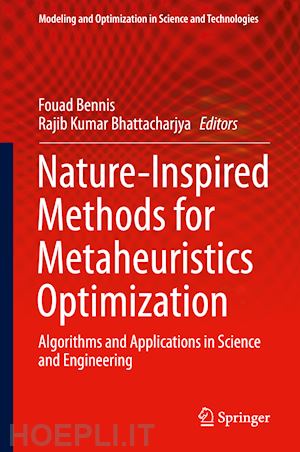
Questo prodotto usufruisce delle SPEDIZIONI GRATIS
selezionando l'opzione Corriere Veloce in fase di ordine.
Pagabile anche con Carta della cultura giovani e del merito, 18App Bonus Cultura e Carta del Docente
Part I. Algorithms: 1. Genetic algorithms: A mature bio-inspired optimization technique for difficult problems.- 2. Introduction to Genetic Algorithm with a Simple Analogy.- 3. Interactive genetic algorithm to collect user perceptions. Application to the design of stemmed glasses.- 4. Differential Evolution and its application in Identification of Virus Release Location in a Sewer Line.- 5. Arti?cial Bee Colony Algorithm and An Application to Software Defect Prediction.- 6. Firefly Algorithm and its Applications in Engineering Optimization.- 7. Introduction to Shuffled Frog Leaping Algorithm and its Sensitivity to the Parameters of the Algorithm.- 8. Groundwater Management using Coupled Analytic Element based Transient Groundwater Flow and Optimization Model.- 9. Investigation of Bacterial Foraging Algorithm applied for PV parameter estimation, Selective harmonic elimination in inverters and optimal power flow for stability.- 10. Application of artificial immune system in Optimal Design of Irrigation Canal.- 11. Biogeography Based Optimization for Water Pump Switching Problem.- 12. Introduction to Invasive Weed Optimization Method.- 13. Single-Level Production Planning in Petrochemical Industries using Novel Computational Intelligence Algorithms.- 14. A Multi-Agent platform to support knowledge based modelling in engineering Design.- Part II. Applications: 15. Synthesis of reference trajectories for humanoid robot supported by genetic algorithm.- 16. Linked Simulation Optimization Model for Evaluation of Optimal Bank Protection Measures.- 17. A GA Based Iterative Model for Identification of Unknown Groundwater Pollution Sources Considering Noisy Data.- 18. Efficiency of Binary Coded Genetic Algorithm in Stability Analysis of an Earthen Slope.- 19. Corridor allocation as a constrained optimization problem using a permutation-based multi-objective genetic algorithm.- 20. The constrained single-row facility layout problem with repairing mechanisms.- 21. Geometric size optimization of annular step fin array for heat transfer by natural convection.- 22. Optimal control of saltwater intrusion in coastal aquifers using analytical approximation based on density dependent flow correction.- 23. Dynamic Nonlinear Active Noise Control. A Multi-Objective Evolutionary Computing Approach.- 24. Scheduling of Jobs on Dissimilar Parallel Machine using Computational Intelligence Algorithms.- 25. Branch-and-Bound Method for Just-in-Time Optimization of Radar Search Patterns.- 26. Optimization of the GIS based DRASTIC model for Groundwater Vulnerability Assessment.
Professor Fouad Bennis is a Professor of Mechanical Engineering and Director of the International Relations Department at the Ecole Centrale de Nantes. He received his Engineering Master Degree (1987) and PhD in robotics (1991) from the same University. He has been awarded with the Order of Academic Palms as a Chevalier and as a Commandeur in 2007 and 2016, respectively. His research at the Laboratory of Digital Sciences of Nantes (LS2N), Ecole Centrale de Nantes, is covering Multi-Disciplinary Optimization, Product and Process design, and Digital Human Modeling. In particular, he is dealing with: analysis of mechanical tolerance, robust, fuzzy and collaborative design, and integration of virtual reality in working environments He has achieved important results in studying human performance using virtual reality. He has gained 30 years of teaching and research experience. He is author of 13 book chapters and more than 150 peer-reviewed scientific publications in anumber of renowned international journals and conference proceedings.
Prof. Rajib Kumar Bhattacharjya is a Professor in the Department of Civil Engineering at the Indian Institute of Technology Guwahati, India. He received his Bachelor's and Master’s Degree in Civil Engineering from Gauhati University, India, in 1993 and 1995, respectively, and his Ph.D. in Civil Engineering from the Indian Institute of Technology Kanpur, India, in 2004. His research interests include classical and non-classical optimization methods, groundwater management, groundwater pollution control, and management of saltwater intrusion in coastal aquifers, as well as artificial neural networks and their applications in civil engineering. He has gained more than 20 years of teaching and research experience. He has authored more than 70 peer-reviewed scientific publications in renowned international journals and conference proceedings, and has served as a co-editor of two recent books i.e. “Urban Hydrology, Watershed Management and Socio-Economic Aspects” and “Urban Ecology, Water Quality and Climate Change”, both published by Springer, in 2016 and 2018, respectively. At the Indian Institute of Technology Guwahati, he has taught courses on subsurface hydrology, hydrology, optimization methods, water resources planning and management, among others. He has also been a visiting professor at other institutes, including the Dalhousie University, in Halifax, Canada and the Ecole Centrale Nantes, in France.











Il sito utilizza cookie ed altri strumenti di tracciamento che raccolgono informazioni dal dispositivo dell’utente. Oltre ai cookie tecnici ed analitici aggregati, strettamente necessari per il funzionamento di questo sito web, previo consenso dell’utente possono essere installati cookie di profilazione e marketing e cookie dei social media. Cliccando su “Accetto tutti i cookie” saranno attivate tutte le categorie di cookie. Per accettare solo deterninate categorie di cookie, cliccare invece su “Impostazioni cookie”. Chiudendo il banner o continuando a navigare saranno installati solo cookie tecnici. Per maggiori dettagli, consultare la Cookie Policy.